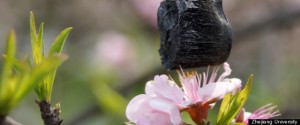Nanotechnology is all about making unique useful materials. Now the worlds lightest material has been recorded. According to these scientists the material a carbon aerogel, if it were the size of a human body it would be less than 0.5 ounces. So light a glob of it can dance on the tip of a flower! Being lightweight isn’t always great but it is if the material is strong and durable. This carbon aerogel stuff can also absorb 900 times its weight in liquid. How is it made? The process is more or less the freeze drying of carbon nanotubes and graphene

